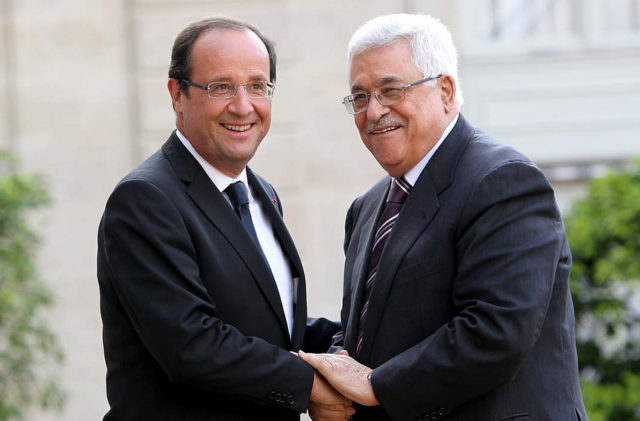
The French government seems to be falling over itself to undo its craven vote in favor of a UNESCO resolution accusing Israel — referred to as the “Occupying Power” in Jerusalem — of destroying historic structures on the Temple Mount:
- Prime Minister Manuel Valls apologized. “This UNESCO resolution contains unfortunate, clumsy wording that offends and unquestionably should have been avoided, as should the vote.”
- Interior Minister Bernard Cazeneuve apologized. [I do] “not take a supportive view of the text.” The resolution “should not have been adopted” and “was not written as it should have been.”
- President François Hollande apologized. [The vote was] “unfortunate,” and, “I would like to guarantee that the French position on the question of Jerusalem has not changed… I also wish to reiterate France’s commitment to the status quo in the holy places in Jerusalem… As per my request, the foreign minister will personally and closely follow the details of the next decision on this subject. France will not sign a text that will distance her from the same principles I mentioned.”
- Foreign Minister Jean-Marc Ayrault did not quite apologize: “France has no vested interest but is deeply convinced that if we do not want to let the ideas of the Islamic State group prosper in this region, we must do something.”
It sounds as if they thought they had made a mistake. But the vote was not a mistake. Underestimating the depth of Israel’s anger about it might have been a mistake, but not the vote. The French — who, according to their foreign minister, have “no vested interest” but need to “do something” about Islamic State — could not have thought that a UNESCO resolution that offended Israel would do anything to slow ISIS “in the region” or in Europe. There is no way it could; the two are not connected.
The French however, apparently thought a vote accusing Israel of something, anything, would keep the Palestinian Authority from presenting a resolution on Palestinian independence to the UN Security Council; Ayrault implied in Israel that the UNESCO vote was a quid pro quo. Why? The French have a veto they could exercise in the UN Security Council. But the Palestinians might then object to France replacing the U.S. as the “Great Power” in the “peace process.” They already have experience with a veto-wielding interlocutor — the U.S. — and they do not want another. The price of an elevated status for the French appears to entail not vetoing Palestinian resolutions, voting for them in UNESCO, and sacrificing Israel in a process that will end in French recognition of a Palestinian State, whether Israel agrees to be bound to the altar or not.
It should be noted that the Russians immediately put out a statement that the UN-sponsored Middle East Quartet is the “only mechanism” for resolving the Palestinian issue. It is not clear whether Putin was supporting American or Israeli interests. Iran and ISIS are similarly disinclined to see the French ascend on this issue.
The Palestinians, on the other hand, are thrilled to have an international conference where others will make demands of Israel as the Palestinian experiment in self-government degenerates into poverty and chaos by its own economic, political and social choices, looking more like Venezuela every day.
For Palestinians in the street, killing Jews in the “knife intifada” did not take the edge off the popular anger and frustration with their own leadership.
Under the circumstances, the French, and France’s enabler, U.S. Secretary of State John Kerry, might usefully consider the approach taken in fact by President George W. Bush, which required changes in Palestinian behavior as a prerequisite for support for statehood. Honored mainly in the breach, Bush’s 2002 speech nevertheless remains the best statement of American, and Western, interest in moving the Palestinians toward a functioning state:
It is untenable for Israeli citizens to live in terror. It is untenable for Palestinians to live in squalor and occupation. And the current situation offers no prospect that life will improve. Israeli citizens will continue to be victimized by terrorists, and so Israel will continue to defend herself…
Peace requires a new and different Palestinian leadership, so that a Palestinian state can be born.
I call on the Palestinian people to elect new leaders, leaders not compromised by terror. I call upon them to build a practicing democracy, based on tolerance and liberty. If the Palestinian people meet these goals, they will be able to reach agreements with Israel, Egypt and Jordan on security and other arrangements for independence.
And when the Palestinian people have new leaders, new institutions and new security arrangements with their neighbors, the United States of America will support the creation of a Palestinian state whose borders and certain aspects of its sovereignty will be provisional until resolved as part of a final settlement in the Middle East.
I wrote at the time that,
“Mr. Bush made one huge leap of faith in the speech when he said, ‘I’ve got confidence in the Palestinians. When they fully understand what we’re saying, that they’ll make the right decisions when we get down the road for peace.’ What, in fact, will the U.S. do if the Palestinian people weigh a new constitution and free political parties and STILL decide that blowing up Jews is better? What if they have transparent government, economic advancement and an independent judiciary, and STILL decide Jewish sovereignty must be eradicated with the blood of their children?”
The Palestinians have answered half the question. They do not have a “practicing democracy based on tolerance and liberty,” but erasing Israel evidently remains their goal. Rather than offering no-cost recognition, the French should demand a few changes first.

